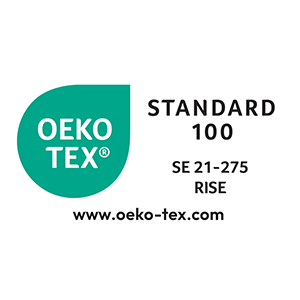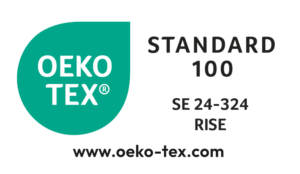OUR CARE INSTRUCTIONS FOR THE ENVIRONMENT
At Ten Textiles, we recognise that the textile industry is one of the largest polluters in the world. Imagine the impact if the whole industry moved towards more sustainable ways! Not only do we want to be a part of that movement, we want to be a step ahead. There is always more to be done, but here is what we are doing at the moment.
It all begins with the yarn
Our yarn suppliers are chosen with great care and based on shared values. We only buy from OEKO-TEX® STANDARD 100-certified suppliers, making sure already at this stage that no harmful substances can be found in the yarn. The yarn in our recycled polyester rib is fully traceable thanks to the Global Recycled Standard that our chosen supplier is certified with. We buy our wool and mulesing-free merino wool from a Woolmark- and Responsible Wool Standard-certified supplier. All of our suppliers are located in Europe, enabling shorter transits for the yarn to get to our factory. We are always on the lookout for new suppliers that can provide us with new and innovative fibres, organic and responsible alternatives as well as more energy-efficient ways of producing the yarn.
The world does not need more textile waste
To reduce overproduction and minimise textile waste at our factory, we only produce on demand and do not have a ready stock. We believe that durability is a key element of sustainability and that is why we make sure that our fabrics are high-quality and wear-resistant. Most of our fabrics are mono-materials, which are easier to recycle. Our product range includes recycled polyester and biodegradable options such as wool. It is our aim to make a full switch to recycled polyester in the near future as well as switch to other recycled options where possible.
Sustainable stretch – 0 % elastane
Stretch. Return. Repeat. By using knitting excellency instead of elastane to achieve the stretch in our rib fabrics, we make sure that the fabric keeps its tensibility and can be used for a long time. Not only do we extend the lifecycle of the fabric – by not mixing in elastane it is also easier to recycle the fabric. Elastane is notoriously difficult to recycle, non-biodegradable as well as resource intensive to produce. We are proud that we can make you flexible in a more sustainable manner.
Renewable energy
To run our knitting machines, we need electricity. Our factory building is currently using electricity generated from solar power plants, windmill parks and hydropower plants. Our annual energy consumption is around 25000 kWh at the moment.
Dyeing is a part of the process...
…but we try to make it as sustainable as possible. This is currently only done to our polyester range, the other materials in our selection are either yarn- or dope-dyed. At the moment we can also offer dope-dyed polyester in a few colour alternatives. All of our fabrics are OEKO-TEX® STANDARD 100-certified and all dyes and treatments are compliant with REACH. We are very lucky to be located right next door to the leading dye house in Lithuania, where they help us make the dyeing process more environmentally-friendly thanks to their efforts and investments in solar panels and wastewater management. By being neighbours, we also eliminate the need for transportation to and from dyeing. We only use a non-fluorinated (PFAS-free) treatment to create our water-repellent rib fabric and we only use inherent fibres for flame resistancy instead of flame-retardant treatments.



